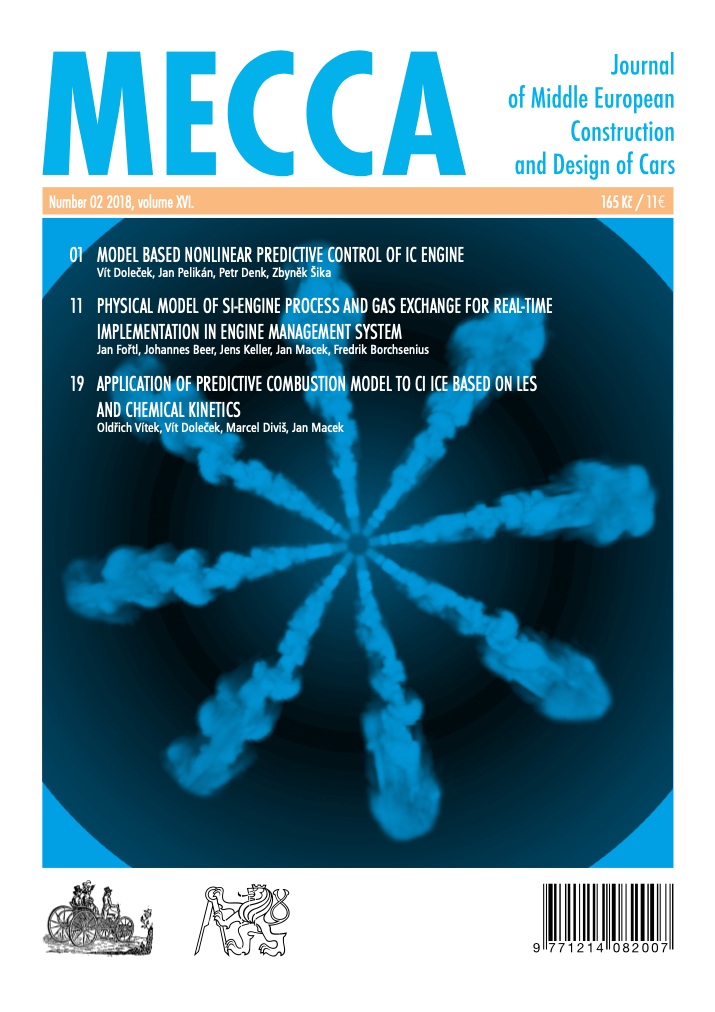Authors
- Vít Doleček Czech Technical University in Prague, Department of Automotive, Combustion Engine and Railway Engineering, Technická 4, CZ‐16607 Prague 6, Czech Republic
- Jan Pelikán Czech Technical University in Prague, Department of Mechanics, Biomechanics and Mechatronics, Technická 4, CZ‐16607 Prague 6
- Petr Denk Czech Technical University in Prague, Department of Mechanics, Biomechanics and Mechatronics, Technická 4, CZ‐16607 Prague 6
- Zbyněk Šika Czech Technical University in Prague, Department of Mechanics, Biomechanics and Mechatronics, Technická 4, CZ‐16607 Prague 6
Keywords:
SIMULATION MODEL, 1-D SIMULATION, CONTROL ALGORITHM, PREDICTIVE CONTROL, PREDICTIVE MODEL, LOLIMOTAbstract
In the paper is described development of predictive controller of combustion engine. The basic part of control system is predictive model describing future engine behavior in transient conditions. Accurate identification of controlled system, combustion engine in our case, is very important for high level of control precision. Typical engine operation is defined by driving cycle, which is used for engine operation parameters identification. Developed predictive control system was subsequently tested using software‐in‐the‐loop technique.
V tomto článku je popsán vývoj prediktivního řídicího systému pro spalovací motor. Základem prediktivního kontrolního systému je prediktivní model popisující chování v krátké budoucnosti přechodového děje. Přesná identifikace řízené soustavy, v našem případě spalovacího motoru, je velmi důležitá z hlediska přesnosti řízení. Typický provoz motoru je definován jízdním cyklem, který byl z tohoto důvodu použit pro identifikaci stavových parametrů motoru. Vyvinutý prediktivní systém řízení byl následně otestován s využitím software‐in‐the‐loop techniky.
References
Camacho E. F., Bordons C., (1999). Model Predictive Control. Springer Verlag, Berlin.
Valasek M., et al., (2005). Model Based Predictive Control of Combustion Engine with Constraints. Review of Automotive Engineering of Japan SAE2005, Vol.26, No.3, pp.349‐356.
Sika Z., Valasek M., Florian M., Macek J., Polasek M., (2008). Multilevel Predictive Models of IC Engine for Model Predictive Control Implementation. SAE Technical Paper 2008‐01‐0209, doi: 10.4271/2008‐01‐0209.
Nelles O., (1999). Nonlinear system identification with local linear fuzzy‐neuro models. Automatisierungs technik, Shaker Verlag, Aachen.
Steinbauer P., Denk P., Macek J., Morkus J., Sika Z., (2015). E‐vehicle energy consumption optimization based on fleet and infrastructure information. Book Series: Advances in Intelligent Systems and Computing, Warsaw, Poland, Vol. 393, pp.273‐278. doi: 10.1007/978‐3‐319‐23923‐1_41.
Steinbauer P., Husák J., Pasteur F., Denk P., Macek
J., Sika Z., (2018). Predictive control of commercial e‐vehicle using a priori route information. International Journal of Powertrains, vol.7, issue 1‐3, pp.53‐71.
doi: 10.1504/IJPT.2018.090362.
Doleček V., Florián M., Šika Z., (2015). Model Based Nonlinear Predictive Control of IC Engine in Unsteady Operation Mode. XLVI. International Scientific Conference of the Czech and Slovak Universities and Institutions Dealing with Research of Internal Combustion Engines. ISBN 978‐80‐227‐4424‐9.
Sika Z., Valasek M., Florian M., Macek J., Polasek M., (2008). Multilevel Predictive Models of IC Engine for Model Predictive Control Implementation. SAE Technical Paper 2008‐01‐0209.
Macek J., Polasek M., Sika Z., Valasek M., Florian M., Vitek O., (2006). Transient Engine Model as a Tool for Predictive Control. SAE Technical Paper 2006‐01‐0659.

License
Authors who publish with this journal agree to the following terms:
1. Authors retain copyright and grant the journal right of first publication with the work simultaneously licensed under a Creative Commons Attribution License that allows others to share the work with an acknowledgement of the work's authorship and initial publication in this journal.
2. Authors are able to enter into separate, additional contractual arrangements for the non-exclusive distribution of the journal's published version of the work (e.g., post it to an institutional repository or publish it in a book), with an acknowledgement of its initial publication in this journal.
3. Authors are permitted and encouraged to post their work online (e.g., in institutional repositories or on their website) prior to and during the submission process, as it can lead to productive exchanges, as well as earlier and greater citation of published work (See The Effect of Open Access).
Source: https://ojs.cvut.cz/ojs/index.php/MECCA/article/view/6758
Posted by: mattwolfenspergere0194677.blogspot.com
Post a Comment